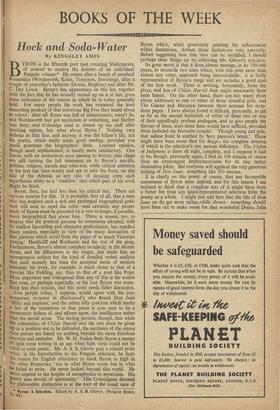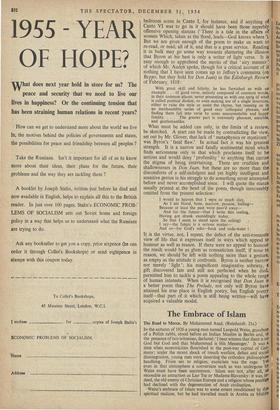Hock and Soda-Water
By KINGSLEY AMIS BYRON is the fifteenth poet (not counting Shakespeare, of course) to receive the honour of an individual Penguin volume.* He comes after a bunch of standard Romantics (Wordsworth, Keats, Tennyson, Browning), after a couple of yesterday's fashions (Donne, Hopkins) and after Mr. C. Day Lewis. Byron's late appearance on this list, together With the fact that he has actually turned up on it at last, gives some indication of the esteem in which he is today generally held. For many people his work has remained the least interesting product of that notorious Big Five they heard about at school: after all, Keats was full of sensuousness, wasn't he, and Wordsworth had got mysticism or something, and Shelley Was fiery, and Coleridge used to dream up his stuff after smoking opium, but what about Byron ? Nothing very definite in that line, and anyway it was the fellow's life, not his poetry, which really made good reading, provided you could penetrate the biographers' hints. Learned opinion, though more sophisticated, is hardly more satisfactory. One learns, with an amazement soon passing to horror, that chaps are still turning the full treatment on to Byron's sex-life, politics, religion, travels and what-not, while critical attention to his text has been scanty and apt to take the form, on this side of the Atlantic at any rate, of devising some such superfluous entity as a ' tradition ' into which part of his work niight be fitted.
Byron, then, has had less than his critical due. There are various reasons for this. It is probable, first of all, that a man Who has inspired such a rich and prolonged biographical gold- rush will tend to repel the critic—and certainly any proper study of Byron must be preceded by a vow to forget, if possible, every biographical fact about him. There is reason, too, to suspect that the poetical persona he sometimes adopted, with its shallow lip-curling and obsessive gesticulation, has repelled Many readers, especially in view of the many derivatives of that persona which scowl from the pages of so much Victorian Writing: Heathcliff and Rochester and the rest of the gang. Furthermore, Byron's almost complete incapacity in the shorter forms, and his diffuseness in the longer, has made him an Unresponsive subject for the kind of detailed verbal analysis that until recently has been the accepted mode of modern criticism; his irony, for example, is much closer to that of a novelist like Fielding, say, than to that of a poet like Pope. More important and widespread than any of this is the notion that even, or perhaps especially, at his best Byron was some- thing less than serious, and this point needs fuller discussion. Few people today, I suppose, would agree with the con- temporary reviewer in Blackwood's who found Don Juan ' filthy and impious,' and the rather silly cynicism which marks a few of the transitions in that poem is now seen to be a momentary failure of, and affront upon, the intelligence rather than the moral sense. The feeling persists, though, that while the solemnities of Childe Harold and the rest must be given up as a position not to be defended, the successes of the ottava lima poems are based on nothing beyond the more frivolous interests and attitudes. Mr. W. H. Auden finds Byron a master Of light verse writing in an age when light verse could not be adult or even poetic. Mr. A. S. B. Glover puts a related point When, in his Introduction, to the Penguin selection, he finds the reason for English reluctance to mark Byron as high as the other Romantics 'not in what Byron wrote but in what he failed to write. He never looked beyond this world. He never aspired to the heights of metaphysics or mysticism. His Poetry was devoid of spirituality.' This Coleridgean demand Byron which, while generously praising his achievement within limitations, defines those limitations very narrowly. Before suggesting how this view can be modified, I should perhaps clear things up by criticising Mr. Glover's seleztion. Its great merit is that it does almost manage, in its 350-odd pages, to reconcile two aims which, with this poet more than almost any other, approach being irreconcilable : it is fairly representative of Byron's range and yet includes a good deal. of his best work. There is nothing, fortunately, from the plays, and less of Childe Harold than might reasonably have been feared. On the other hand, there are too many short pieces addressed to one or other of those dreadful girls, and The Giaour and Mazeppa between them account for sixty- three pages. I have always found it difficult, personally, to get as far as the second hemistich of either of these two or any of their appallingly profuse analogues, and to give people the flavour of them, sixty-three lines would have sufficed, provided these included my favourite couplet : Though young and pale, that sallow front Is scathed by fiery passion's brunt.' There might have been room then for Beppo, the complete absence of which is the selection's one serious deficiency. The Vision of Judgment is there all right, complete, and I suppose it had to be, though, personally again, I find its 106 stanzas of ottava rima an extravagant deployment-area for its tWQ rather diminutive jokes. But everyone will applaud the very generous helping of Don Juan: something like 500 stanzas.
It is chiefly on this poem, of course, that any favourable assessment of Byron must depend, and for this reason I am inclined to think that a complete text of it might have been a better bet than any 9uasi-representative selection from the poetry as a whole. I might just add here that the bits of Don Juan we do get seem rather. oddly chosen : something should have been cut to make room for that wonderful Donna Julia bedroom scene in Canto I, for instance, and if anything of Canto VI was to go in it should have been those superbly offensive opening stanzas (` There is a tide in the affairs of women Which, taken at the flood, leads—God knows where ').
But we are given enough of the poem to make us want to re-read, or read, all of it, and that is a great service. Reading it in bulk may go some way towards shattering the illusion that Byron at his best is only a writer of light verse. It is easy enough to apprehend the merits of that 'airy manner' of which Mr. Auden spoke, though for a critical account of it nothing that I ha‘ seen comes up to Jeffrey's comments (on Beppo, but they hold for Don Juan) in the Edinburgh Review of February, 1818: With great skill and felicity, he has furnished us with an example . . . of good verse, entirely composed of common words, in their common places; never presenting us with one sprig of what is called poetical diction, or even making use of a single inversion, either to raise the style or assist the rhyme, but running on in an inexhaustible series of good easy colloquial phrases, and finding them fall into verse by some unaccountable and happy fatality. . . . The greater part is extremely pleasant, amiable, and gentlemanlike.
What must be added can only, in the limits of a review. be sketched. A start can be made by contradicting the view, set out by Mr. Glover, that lack of metaphysics or mysticism' was Byron's 'fatal flaw.' In actual fact it was his greatest strength. It is a narrow and fatally sentimental mind which finds seriousness only in that which proclaims itself to be serious and would deny ' profundity ' to anything that carries the stigma of being entertaining. There are crudities and shallownesses in Don Juan, but these are no more than the discomforts of a self-indulgent and yet highly intelligent and sensitive genius in his struggle to do something never attempted before and never accomplished since. I will quote the stanza usually printed at the head of the poem, though inexcusably omitted from the present selection : I would to heaven that I wcre so much clay, As I am blood, bone, marrow, passion, feeling— Because at least the past were pass'd away—
And for the future—(but I write this reeling, Having got drunk exceedingly today,
So that I seem to stand upon the ceiling) I say—the future is a serious matter—
And so—for God's sake—hock and soda-water 1 ,
It is the virtue, not, I repeat, the defect of the anti-romantic view of life that it expresses itself in ways which appeal to humour as well as reason. If there were no appeal to humour the result would be as glum as romanticism itself; if none to reason, we should be left with nothing more than a gesture, as empty as the attitude it confronts. Byron is neither narrow nor merely ' light '; his magnificent imaginative sobriety, a gift discovered late and still not perfected when he died, permitted him to tackle a poem appealing to the whole range of human interests. When it is recognised that Don Juan is a better poem than The Prelude, not only will Byron have attained his true place in English poetry, but English poetr, itself—that part of it which is still being written—will hale acquired a valuable model.



























 Previous page
Previous page